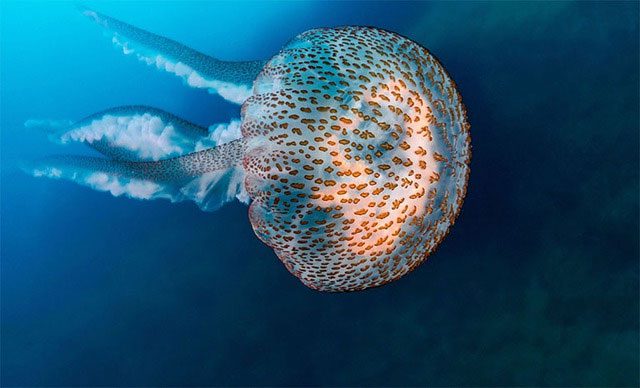When it comes to jellyfish, most people feel a sense of fear and caution due to the unpleasant sting that these creatures can inflict upon contact. Few would even consider trying to eat this marine animal.
However, these fascinating creatures can offer unexpected health benefits. For centuries, jellyfish have been regarded as a nutritious delicacy in various cuisines around the world.
Nutritional Value of Jellyfish
Although not a traditional source of protein, jellyfish are rich in collagen, an essential protein that supports skin elasticity, joint health, and tissue recovery.
In particular, collagen plays a vital role in maintaining youthful skin and aiding wound healing.

Jellyfish are low in calories and fat, making them ideal for those looking to diet while still getting adequate nutrition.
In 100g of jellyfish, there are 12.3g of protein, 0.1g of fat, 3.9g of carbohydrates, 182mg of calcium, 9.5mg of iron, 132mg of iodine, and many other vitamins. Jellyfish also contain a significant amount of minerals, providing essential elements like iron, zinc, and magnesium, all of which are important for overall health, strengthening the immune system, and enhancing well-being.
Local knowledge suggests that consuming jellyfish can help alleviate blood heat, blood stasis-related issues such as acne, headaches, dizziness, high blood pressure, cough with phlegm, constipation, and other related symptoms of fatigue and blood stasis.
Major Health Benefits
Enhancing Cardiovascular Health
The collagen in jellyfish may play an important role in improving cardiovascular health by enhancing arterial elasticity and potentially reducing the risk of heart-related issues.
The substantial omega-3 fatty acid content in jellyfish also provides significant benefits such as anti-inflammatory properties and actively supporting overall heart health.

Jellyfish can significantly contribute to weight management.
Weight Management
With low calorie content and high water content, jellyfish can play an important role in weight management. Eating jellyfish creates a lasting feeling of fullness, accompanied by a wealth of nutrients that help control appetite and greatly assist in weight loss efforts.
Antioxidant Properties
Jellyfish contain antioxidants that combat free radicals, reduce oxidative stress, and may lower the risk of chronic diseases. The potent antioxidants found in jellyfish play a crucial role in enhancing overall health by boosting immune function and limiting inflammation, providing a comprehensive approach to well-being.
Cultural and Environmental Significance
Flavor of Traditional Cuisine
In many Asian cuisines, particularly in China and Japan, jellyfish have been a traditional dish for centuries. With a unique texture and a variety of flavors, jellyfish are skillfully prepared using diverse methods—from marinating to salting or pickling—each dish offering its own enticing flavor.
Chefs and food enthusiasts worldwide are looking to incorporate jellyfish into modern cuisine. From salads to stir-fries, the versatile texture of jellyfish allows for innovative culinary experimentation, bringing this novel food source to global residents.

Jellyfish have been a traditional dish for centuries.
Although consuming jellyfish offers promising health benefits, it is essential to note that not all jellyfish species are edible, and proper preparation is needed to remove toxins from jellyfish. Those with seafood allergies or concerns should consult healthcare professionals before adding jellyfish to their diet.



















































